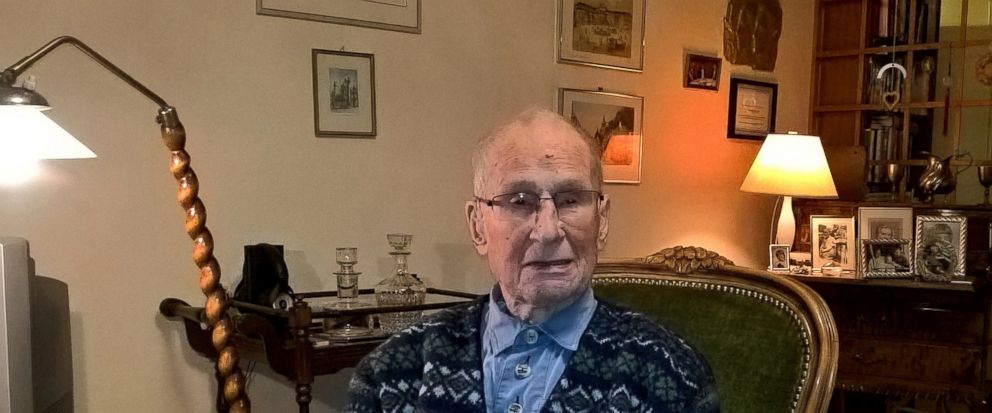101-year-old Olympian's life tells story of Finnish century
Interested in Olympics?
Add Olympics as an interest to stay up to date on the latest Olympics news, video, and analysis from ABC News. Olympics Add Interest
Torsten Liljeberg's handshake is solid, and he's fit as only a former Olympian can be. For those who don't know him, he could pass for someone in his 80s enjoying his retirement at his seaside home in Helsinki.
Liljeberg is in fact 101 years old — a year older than his homeland Finland, a nation celebrating Wednesday the 100th anniversary of its independence from the Russian Empire.
Perhaps more than most others, the life of Liljeberg — a World War II veteran and an Olympic canoeist — tells the story of the tumultuous journey taken in the past century by this small Nordic country and its people, known for their passion for sport, love for nature and grit for survival against the odds.
As a soldier, Liljeberg was at the front lines more than once as Finland fought heavy battles against the Soviet Union. A talented canoeist and kayaker, he represented the national team on home waters at the 1952 Helsinki Olympics — a watershed moment and an important morale-booster in a postwar, sport-crazed Finland.
"I think Finland has done fine. Things are going forward," Liljeberg says over a cup of coffee, pondering the past 100 years of this small nation of 5.5 million. "People have work and the economy is growing. That's very important. And we have a strong army, too."
Known to his friends by the nickname Nappus, Liljeberg was born in October 1916, when Finland was still an autonomous Grand Duchy of the Russian Empire. The nation declared its independence from the Russian Empire on Dec. 6, 1917.
The area now known as Finland was part of the Swedish Kingdom for nearly 700 years since the late 12th century. It fell into Russian hands in 1809 after Europe's Napoleonic wars, though it was allowed to develop as an autonomous part of the Czarist empire until 1917.
Finns seized their opportunity for independence amid the chaos of the Russian Revolution, and even got a blessing from the Bolshevik leader Vladimir Lenin.
Liljeberg remembers his childhood in the early 1920s Helsinki — the capital of the proud new Nordic nation — as a "sunny happy time" filled with fishing and sports, particularly swimming, canoeing and skiing in the wintertime. He took up canoeing in his early teens, and won 15 Finnish kayaking championships.
His carefree youth came to an abrupt end in November 1939 with the breakout of the bitter Winter War with the Soviet Union.
Liljeberg, then 23, was soon called to arms and sent straight to the front line to help in heavy battles. It's a time he doesn't like to talk about.
"So many of my friends died. I think about it every day," he says quietly. "It's a miracle I didn't get injured. I can't understand it."
The Winter War came to an end in March 1940 but peace didn't last long. A year later, Finland found itself again in conflict with its eastern neighbor, fighting the Soviets alongside Nazi Germany.
Liljeberg served again at the front until Finland concluded a truce with Moscow in September 1944, with the country finding itself beaten and impoverished — but free. He resumed work as an inspector at the Helsinki Telephone Association — the predecessor today's mobile operator Elisa — and stayed with the company until his retirement in 1981.
After the war he coached and trained young canoeists and met his wife Haga, 87. He even traveled to Soviet Union, Finland's former enemy, to compete in Leningrad, now St. Petersburg. He gave up canoeing only at his late 80s and still exercises with a daily routine to keep fit.
"You can say sports saved me after the war," Liljeberg said, adding that many war veterans took up drinking and failed to adjust to civil life.
Last year, he was honored by the International Canoeing Federation with a diploma and presented with a replica medal from the 2016 Olympics in Rio de Janeiro for his exceptionally long career in canoeing and contribution to the sport.
Finland's President Sauli Niinisto honored Liljeberg's 100th birthday last year by inviting him and his wife as special guests to the annual Independence Day reception at the Presidential Palace.
"I was overwhelmed. It was a great honor," Liljeberg says with sparkling eyes. "Who would have thought that I would end up there? I'm just an ordinary guy."
- Star
Add Interests Customize your news feed by choosing the topics that interest you.
To save your interests across all devices Log In or Sign Up »Source – abcnews.go.com

